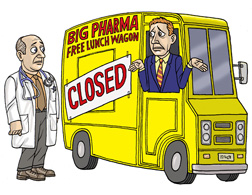July 12th, 2010 by AndrewSchorr in Better Health Network, Health Policy, News, Opinion, Research
No Comments »

They have a tough job, those government doctors, scientists, and bureaucrats who are charged with assessing the safety and effectiveness of proposed new medical products. As you know, they rely largely on studies presented by the applicants.
The Food and Drug Administration (FDA) has the power to not approve a new drug or product or even pull it off the market. Right now it is considering limiting or pulling GlaxoSmithKline’s (GSK) diabetes drug, Avandia, because of newly discovered data that it may have caused heart attack in some patients –- data mysteriously not shown in GSK’s own studies. If the drug is pulled it will cost GSK billions of dollars in lost revenue but, from the FDA’s point-of-view, it will be protecting the public. And, after all, there are safer diabetes drugs on the market as alternatives. Read more »
*This blog post was originally published at Andrew's Blog*
July 12th, 2010 by KevinMD in Better Health Network, Health Policy, News, Opinion, Research
No Comments »

How effective is direct-to-consumer drug advertising? Some think that drug ads should be banned altogether, saying that it encourages patients to ask their doctors for expensive, brand name prescription drugs. It turns out their fears may be overblown.
NPR’s Shots blogs about a recent study looking at the effectiveness of these ads. The numbers, for the pharmaceutical companies anyways, are not encouraging. Read more »
*This blog post was originally published at KevinMD.com*
July 9th, 2010 by RyanDuBosar in Better Health Network, Health Tips, Humor, News
No Comments »

 Normally, the patient calls the pharmacy for a prescription. Now, the prescription is doing that by itself. GlowCaps, a prescription bottle cap made by Vitality, has assumed control for medication compliance.
Normally, the patient calls the pharmacy for a prescription. Now, the prescription is doing that by itself. GlowCaps, a prescription bottle cap made by Vitality, has assumed control for medication compliance.
The bottle cap fits prescription bottles, but has uses cellphone technology to tap into wireless networks. Once connected, the pill bottle does everything imaginable to remind patients to take their pills.
There’s lights — plenty of them. The bottle cap really does glow and make noise to remind patients. Plug-in units wirelessly connected to the bottle cap can be placed anywhere there’s a wall socket. Oh, and it will call you, too, if you forget. The company calls this “Reminders Ramp from Subtle to Insistent.” (Add “relentless” to that.)
Ultimately, GlowCaps tallies compliance and sends reports to caregivers and physicians. Not surprisingly, studies show that constant nagging to take one’s medications works.
*This blog post was originally published at ACP Internist*
July 8th, 2010 by Steve Novella, M.D. in Better Health Network, Health Policy, News, Opinion, Quackery Exposed, Research
No Comments »

Mark Hyman, a proponent of so-called “functional medicine” promoting himself over at the Huffington Post (an online news source that essentially allows dubious medical infomercials to pass as news) has posted a particularly egregious article on personalized medicine for dementia.
In the article Hyman distorts the modern practice of medicine, the current state of genetic science, and the very notion of “disease.” It is, as usual, a fine piece of medical propaganda sure to confuse many a reader. Hyman starts with some standard epidemiology of dementia –- it’s a common and growing disorder –- but then descends quickly into distortion and pseudoscience. Read more »
*This blog post was originally published at Science-Based Medicine*
July 6th, 2010 by GarySchwitzer in Better Health Network, Health Policy, News, Opinion, Quackery Exposed
No Comments »

 “Appetite for Instruction: Why Big Pharma should buy your doctor lunch sometimes” is the headline of an article on Slate.com that has upset many readers. I’m not terribly upset about it because it just seems too naive and misinformed to get upset about. The final line of the piece tells you all you need to know about the tone of the column:
“Appetite for Instruction: Why Big Pharma should buy your doctor lunch sometimes” is the headline of an article on Slate.com that has upset many readers. I’m not terribly upset about it because it just seems too naive and misinformed to get upset about. The final line of the piece tells you all you need to know about the tone of the column:
“Ousting commercial support is creating a huge chasm in medical education, leaving doctors not only hungry but also starved for knowledge.”
A number of online comments were posted in reaction to the piece. Read more »
*This blog post was originally published at Gary Schwitzer's HealthNewsReview Blog*








 “
“







